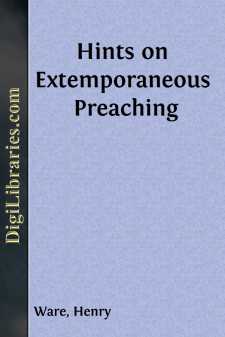Categories
- Antiques & Collectibles 13
- Architecture 36
- Art 48
- Bibles 22
- Biography & Autobiography 813
- Body, Mind & Spirit 142
- Business & Economics 28
- Children's Books 17
- Children's Fiction 14
- Computers 4
- Cooking 94
- Crafts & Hobbies 4
- Drama 346
- Education 46
- Family & Relationships 57
- Fiction 11829
- Games 19
- Gardening 17
- Health & Fitness 34
- History 1377
- House & Home 1
- Humor 147
- Juvenile Fiction 1873
- Juvenile Nonfiction 202
- Language Arts & Disciplines 88
- Law 16
- Literary Collections 686
- Literary Criticism 179
- Mathematics 13
- Medical 41
- Music 40
- Nature 179
- Non-Classifiable 1768
- Performing Arts 7
- Periodicals 1453
- Philosophy 64
- Photography 2
- Poetry 896
- Political Science 203
- Psychology 42
- Reference 154
- Religion 513
- Science 126
- Self-Help 84
- Social Science 81
- Sports & Recreation 34
- Study Aids 3
- Technology & Engineering 59
- Transportation 23
- Travel 463
- True Crime 29
Hints on Extemporaneous Preaching
by: Henry Ware
Categories:
Description:
Excerpt
CHAPTER I.
It is a little remarkable that, while some classes of christians do not tolerate the preaching of a written discourse, others have an equal prejudice against all sermons which have not been carefully precomposed. Among the latter are to be found those who favor an educated ministry, and whose preachers are valued for their cultivated minds and extensive knowledge. The former are, for the most part, those who disparage learning as a qualification for a christian teacher, and whose ministers are consequently not accustomed to exact mental discipline, nor familiar with the best models of thinking and writing. It might seem at first view, that the least cultivated would require the greatest previous preparation in order profitably to address their fellow-men, and that the best informed and most accustomed to study might be best trusted to speak without the labor of written composition. That it has been thought otherwise, is probably owing, in a great measure, to the solicitude for literary exactness and elegance of style, which becomes a habit in the taste of studious men, and renders all inaccuracy and carelessness offensive. He who has been accustomed to read and admire the finest models of composition in various languages, and to dwell on those niceties of method and expression which form so large a part of the charm of literary works; acquires a critical delicacy of taste, which renders him fastidiously sensitive to those crudities and roughnesses of speech, which almost necessarily attend an extemporaneous style. He is apt to exaggerate their importance, and to imagine that no excellencies of another kind can atone for them. He therefore protects himself by the toil of previous composition, and ventures not a sentence which he has not leisurely weighed and measured. An audience also, composed of reading people, or accustomed to the exactness of written composition in the pulpit, acquires something of the same taste, and is easily offended at the occasional homeliness of diction, and looseness of method, which occur in extemporaneous speaking. Whereas those preachers and hearers, whose education and habits of mind have been different, know nothing of this taste, and are insensible to these blemishes; and, if there be only a fluent outpouring of words, accompanied by a manner which evinces earnestness and sincerity, are pleased and satisfied.
It is further remarkable, that this prejudice of taste has been suffered to rule in this way in no profession but that of the ministry. The most fastidious taste never carries a written speech to the bar or into the senate. The very man who dares not ascend the pulpit without a sermon diligently arranged, and filled out to the smallest word, if he had gone into the profession of the law, would, at the same age and with no greater advantages, address the bench and the jury in language altogether unpremeditated. Instances are not wanting in which the minister, who imagined it impossible to put ten sentences together in the pulpit, has found himself able, on changing his profession, to speak fluently for an hour....


